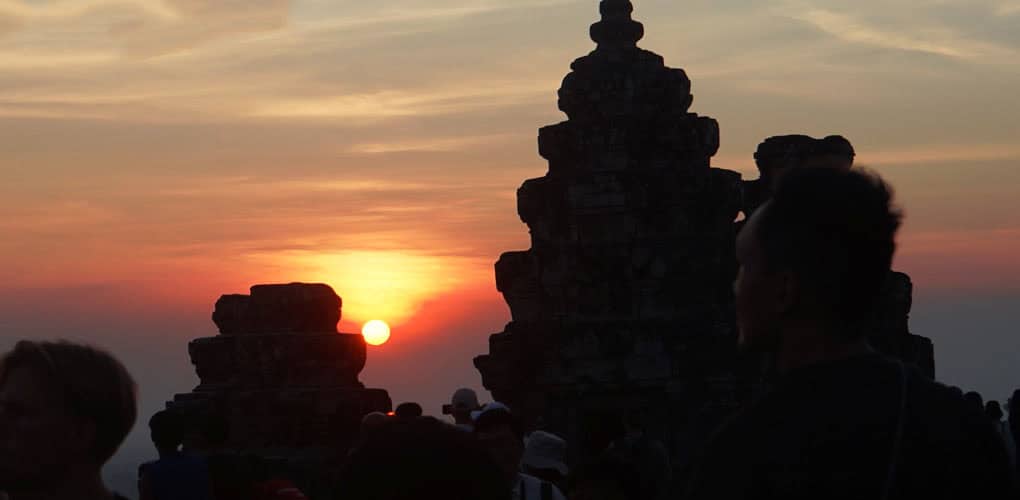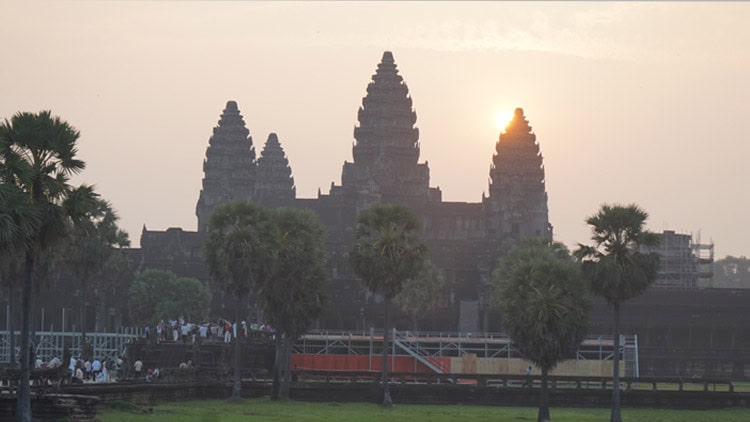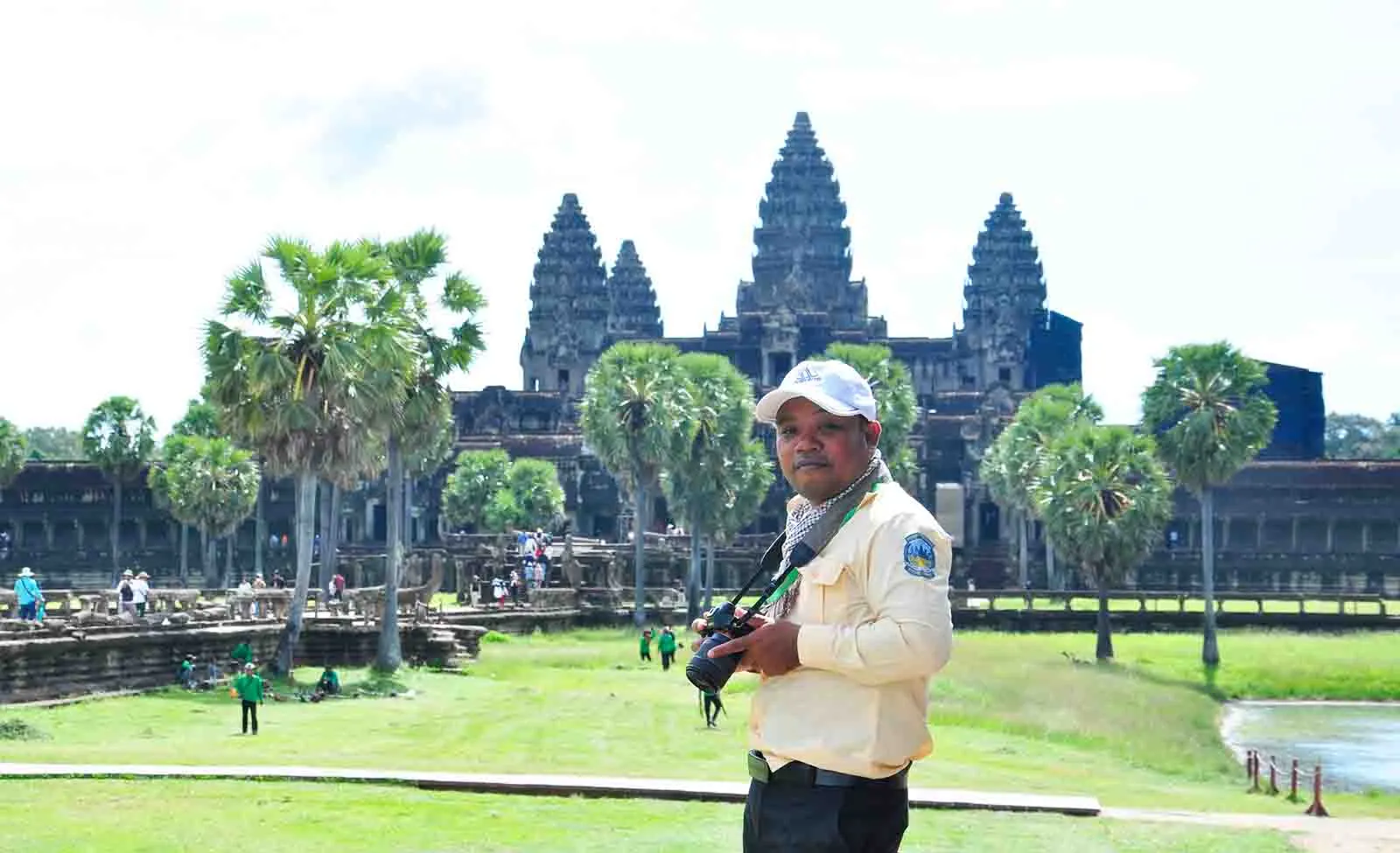Cambodia, known for its awe-inspiring Angkor Wat and bustling capital of Phnom Penh, offers far more...
Best Time to Visit Angkor Wat Siem Reap To Avoid Crowds
Discover the best time to visit Angkor Wat with practical tips on avoiding crowds, choosing the right season, and finding peaceful, off-the-beaten-path temples for a serene experience.
In this guide, I would like to share my personal experiences of the best time to visit Angkor Wat, focusing on how to avoid crowds and experience solitude. This travel guide helps you plan your trip to Cambodia interary with ease.
Understanding the Tourism Seasons

Peak Season (November to March)
The peak season for visiting Angkor Wat runs from November to March, when the weather is at its best—cooler, drier, and perfect for exploring. However, this also means it’s the busiest time, with tourists flocking from all over the world to see the temples. Long lines for tickets, packed pathways, and crowded temples are common during these months.
Pros: The weather is comfortable, making it simple to explore the vast Angkor Archaeological Park. You’ll also have clearer skies, which are ideal for photography, especially during sunrise and sunset.
Cons: Expect large crowds, especially at the most popular temples like Angkor Wat and Ta Prohm. The serene atmosphere can be difficult to find when you’re shoulder to shoulder with other visitors.
Off-Peak Season (April to October)
If you’re willing to brave the heat and rain, the off-peak season can offer a quieter, more reflective experience. April through June marks Cambodia’s hot season, with temperatures frequently soaring above 35°C (95°F). From July to October, the region enters the rainy season, with frequent afternoon downpours.
Pros: The number of tourists drops significantly, so you can explore the temples at a more relaxed pace. Hotel prices also tend to drop during this period, making it a more budget-friendly time to visit.
Cons: The heat can be oppressive in the summer months, and the rains can disrupt your plans, particularly if you’re hoping for clear views during sunrise or sunset.
Shoulder seasons (April and October)
Shoulder seasons—particularly April and October—are ideal times to visit if you’re looking to avoid the massive crowds without dealing with the extremes of weather. April is still hot but less crowded than the peak season, while October marks the end of the rainy season and is a quiet lead-up to the high season.
Pros: You can enjoy fewer crowds while still having relatively favorable weather. October is especially beautiful, as the rains leave the landscape lush and green.
Cons: April can still be quite hot, and October may have occasional rainfall, but these minor drawbacks are worth it for the tranquility you’ll experience.
The best time of day to visit

While choosing the right season is important, timing your visit within the day is just as crucial for avoiding crowds and enjoying a more peaceful experience.
· Sunrise Visits

The sunrise over Angkor Wat is one of the most iconic images in travel, but it’s also a popular activity that draws hundreds of visitors every morning. However, you can still find solitude by arriving extra early—ideally by 4:45 or 5:00 AM—to secure a favorable spot. To avoid the complete sunrise rush, you could explore the outer temples during this time and save Angkor Wat for later in the day.
Tip: For the best views, stand in front of the reflection pools to capture the temple’s silhouette mirrored in the water.
· Late afternoon or sunset

Most visitors leave the temples by mid-afternoon, so arriving around 4:00 PM allows you to explore at a slower pace. Late afternoon also offers softer light for photography, and while sunset at Angkor Wat is less popular than sunrise, it’s still a peaceful time to visit.
Tip: For a quieter sunset experience, head to Phnom Krom Temple, which offers panoramic views of Angkor Wat and the surrounding jungle.
· Midday Visits

Though it might seem counterintuitive, visiting during the hottest part of the day (between 11:00 AM and 1:00 PM) can actually offer some solitude.
Most tour groups retreat for lunch or escape the heat, leaving the temples quieter for independent travelers willing to brave the sun.
Tip: Carry water, wear a hat, and take regular breaks in the shade to avoid heat exhaustion during midday visits.
Weather Considerations and How They Affect Crowds

.Cool, Dry Season (November to March)

The dry season brings ideal weather conditions for temple exploration. Temperatures range from 25°C to 30°C (77°F to 86°F), making it comfortable to spend long hours walking through the ruins. This is the busiest time, so even with perfect weather, crowds are inevitable.
· Hot Season (April to June)

The hot season is intense, but if you can handle the heat, it’s an excellent time to visit with fewer people around. In the middle of the day, the temples often remain deserted, providing you with the freedom to explore without the noise and commotion of larger crowds.
Tip: Start your day early, take a long lunch break, and resume exploring in the late afternoon to avoid the worst of the heat.
· Rainy Season (July to October)

Although it rains frequently, particularly in the afternoon, the rainy season transforms the Angkor temples into a lush, green wonderland. The rain also deters many visitors, leaving the temples significantly quieter. Just be sure to pack rain gear and expect slippery terrain.
Tip: Early morning and late afternoon tend to be the driest times, so plan your visits around these windows for the best experience.
Personalized Tips for a Solitary Experience

· Explore lesser-known temples
While Angkor Wat and Bayon are the most famous temples, the Angkor Archaeological Park is vast, and there are many quieter spots to explore. Temples like Preah Khan, Banteay Srei, and Ta Som offer incredible beauty and a more peaceful atmosphere, often without the throngs of visitors you’ll encounter at the main sites.
· Hiring a Private Guide for Off-the-Beaten Path Tours

A knowledgeable guide siem reap can lead you to hidden gems within the park, away from the busiest areas. Private tours not only offer insightful historical context but also help you experience more secluded spots where you can enjoy moments of quiet reflection.
· Visiting on Weekdays vs. Weekends
Weekends tend to attract more local visitors, so if possible, plan your visit for a weekday. This is especially true during the high season when large tour groups frequent the temples.
· Embrace the rain
Don’t let the weather deter you from visiting during the rainy season. Many visitors retreat indoors during downpours, giving you the opportunity to explore in solitude. The sight of raindrops falling over the ancient ruins creates a mystical atmosphere that’s unique to this season.
Avoid or embrace cultural events and holidays

· Cambodian New Year (April)
Cambodian New Year is a major holiday in Cambodia, celebrated in mid-April. During this time, the temples are filled with locals and visitors alike, making it one of the busiest periods to visit Angkor Wat. Unless you’re eager to experience the festival, it’s best to avoid visiting during this time.
· Lunar Festivals
Other local festivals, such as Pchum Ben or the Water Festival, also see a rise in visitor numbers. While the crowds can be overwhelming, they also offer a unique cultural experience if you’re interested in seeing the temples used as active religious sites during these times.
Final Thoughts
To truly experience the awe-inspiring beauty of Angkor Wat without the crowds, it’s crucial to plan your trip around both the season and the time of day and to how many days needed in siem reap. The best time to visit Angkor Wat depends on your personal preferences—whether you prioritize comfortable weather or quiet solitude. With careful planning, you can create an unforgettable, peaceful visit to one of the world’s greatest wonders.
Create your own tour, you can reserve your trip the way you want it. There are no extra fees or hidden costs.
My name is Rain. I have over 12 years of experience as a local personalized tour guide specializing in private Angkor Wat tours and organizing tours tailored to specific interests in temples and cultural experiences in Siem Reap, Phnom Penh, Battambang, and beyond.
I love traveling and sharing my personal travel experiences through written articles to help others before they make their bookings.
You are considering a trip to Cambodia, are you? Check out some of the travel advice that I have derived from my own personal experiences.
Guide To Visit Koh Rong Island Cambodia For The First Timers
Debating a trip to Koh Rong, Cambodia? Discover pristine beaches, lush jungles, and vibrant culture. Learn...
8-Day Cambodia Itinerary For Siem Reap and Phnom Penh
Discover the perfect 8-day Cambodia itinerary, featuring Angkor Wat, Phnom Penh, and Kampot. Plan your Cambodia...